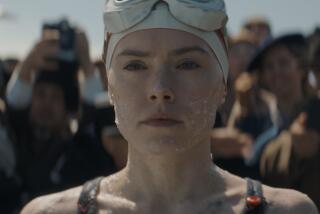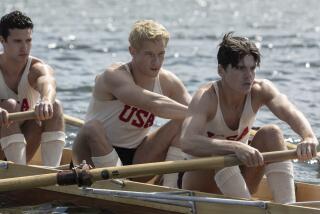Smooth Sailing, Sometimes : Herndon and Goff Hope There Will Be Olympic Medals When They Are Done With Their Dinghy
- Share via
Four years can be a very long time for two people shackled together on a tiny boat by the chain of common purpose.
But Pease Herndon and Cindy Goff are now within reach of their goal: the Olympic sailing victory stand at Pusan, South Korea. Getting as far as the U.S. trials, starting at Newport, R.I., next Tuesday, hasn’t been all smooth sailing. It has included bumpy roads, skinned knuckles, a few laughs, some tears.
“Sometimes it’s hard and we don’t do well, and that’s when times get tough,” Herndon said. “But we’ve never been in a situation where we don’t like each other anymore.”
Goff: “Sometimes you see teams that aren’t doing well, and they hate each other on shore. We work much more as a team.”
Herndon, laughing: “We hate ourselves collectively. If nothing else, if we’re going to spend four years of our lives together, we should do it with somebody we enjoy being with.”
Goff: “Heck, we figure this is more successful than a lot of marriages.”
This is the first Olympics that will have a separate sailing class for women, who will sail 470 dinghies. Herndon and Goff, who based their campaign in Long Beach the past year, are among a group of four teams from which the Olympic representative is expected to emerge.
Although gold and glory are their goals, getting there has been another story.
Scene 1: On their way to an event in New Orleans, they were trucking down a wintry road in Massachusetts in a van they had bought for $1 when their boat, which they were carrying on top of the van, turned over.
“The heater conked out later in Connecticut,” Herndon recalled. “Whichever one of us was driving was wearing all the cold-weather gear, and the other was in a sleeping bag. It was so noisy, we couldn’t even talk to each other.”
Scene 2: Same van, a mid-summer run through the Midwest with no air conditioning and one back door tied open for ventilation.
“The windshield leaked, so we needed a bucket when it rained,” Goff said.
Scene 3: Getting past Soviet border guards with the help of gumdrops.
“The Russian customs want to see everything,” Herndon said. “Two of their dogs zeroed in on this one box my mom and I had packed with some good things, but also things like Pringles and gumdrops. We got through by feeding them all our gumdrops.”
The guards, not their dogs, she meant.
Scene 4: On the lam from the Italian police.
“We picked up a borrowed car in Switzerland and had to drive to Germany to pick up the U.S. coach’s (rubber) boat,” Herndon said. “When we got to the Italian border, they wouldn’t let us across.
“(Normally), they let everybody across--just wave ‘em on through--but once every six months they find somebody to pick on. So here’s two American girls with a new Saab that wasn’t ours and a boat. We went around and around for hours.”
After a while, the women left the border to change clothes, returning in skirts.
“That didn’t work,” Goff said.
So it was back into Switzerland to get more paper work. Finally, they got through--but damaged the border barrier with their boat trailer.
At the regatta two days later, a friend hailed Herndon, “Hey, Pease, the police are looking for you.”
Said Goff: “They said we’d run the border without permission.”
After threatening to confiscate their car and boat, the police relented.
“They just made me sign some paper work and it was all right,” Herndon said.
The alliance of Herndon, 26, and Goff, 27, happened almost by accident.
Herndon’s nickname Pease (Pee-zee) is short for her childhood pet name, Sweetpea. Her real name is Sarah. She started sailing on the lake near her family’s home in Springfield, Ill., but was more interested in riding horses.
She arrived at Brown University in Providence, R.I., a year after Goff, who is from Providence and had gone there to play soccer, not sail. But somehow they wound up sailing together and twice placed sixth in the women’s World Championships.
Well, that was fun, they said, but then Goff graduated and started teaching high school math in Boston. “We decided it was time to get on with our real lives,” she said.
Herndon studied mechanical engineering and later went to work for General Electric.
They didn’t think they had much of a serious future as teammates, anyway.
“We were totally the wrong sizes for the boat, with me driving and Cindy crewing,” Herndon said.
Although each weighs about 135 pounds, Herndon, the helmsman, stands 5 feet 10 inches, and Goff, the crew member, is only 5-5. For ballast leverage in dinghy sailing, it’s better to have the tall person in the crew position.
“We talked about switching in ‘84,” Herndon said. “But Cindy felt she would always be in the back of the boat thinking she’d be doing a better job in the front of the boat, and I’d be thinking the same thing. I think she was afraid I’d be a total klutz as the crew.”
Goff: “Looking back, maybe we did have the time for me to learn to drive and Cindy to crew, but at the time it seemed we were doing OK, (although) we’ve probably had to do 10 times as much work to get results.
“I haven’t driven at all. I’ve always crewed for people. And Pease is a great driver. She should just have a giant crew.”
Herndon: “Finally, one of our friends said, ‘You guys are really stupid. You’re wasting five years of experience over five inches in height.’
“Then in November of ‘84, I called Cindy and said, ‘Well, you want to go sailing?’ ”
They won the ’85 women’s 470 World Championships, were ranked No. 1 in the United States in ’86 and, after slipping to 21st in the women’s worlds at Israel last March, came back to place eighth--first among Americans--in the European Olympic Classes Regatta at Hyeres, France, in April.
Their campaign budget is about $30,000, and they haven’t had much time to work to support it, nor have they had help from their parents.
Herndon: “They’ll give us tons of moral and logistics support, but we’ve had no financial support from our families at all.”
Apparently, costs of $15,000 a year to send a daughter to Brown are one thing, sailing another.
Goff: “The bucks stop here.”
The trail, they hope, will end at Pusan. Then they can get on with their real lives.
More to Read
Go beyond the scoreboard
Get the latest on L.A.'s teams in the daily Sports Report newsletter.
You may occasionally receive promotional content from the Los Angeles Times.






